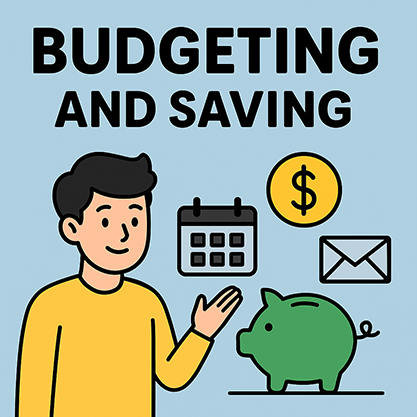Budgeting and Saving: A Complete Beginner's Guide

Effective budgeting and saving are essential skills for financial well-being. They help you control your money, reduce financial stress, and achieve your financial goals, whether that’s paying off debt, building an emergency fund, or saving for a big purchase.
What is Budgeting?
Budgeting is the process of creating a plan for how you will spend your money. It helps you allocate your income to cover expenses, save for future needs, and avoid overspending.
How to Create a Budget
- Calculate Your Net Income: This is the money you take home after taxes and deductions. It’s the actual amount you have available to spend and save.
- Track Your Spending: Write down all expenses for a few weeks, including bills, groceries, entertainment, and small purchases to understand where your money goes.
- Set Financial Goals: Decide what you want to achieve, such as saving for an emergency fund, a holiday, or paying off debt.
- Create Your Budget Plan: Allocate amounts for fixed expenses (rent, utilities), variable expenses (groceries, entertainment), and savings.
- Choose a Budgeting Method: Use a system that works for you, such as the 50/30/20 rule, envelope system, or zero-based budget.
- Adjust and Monitor: Regularly review your budget and adjust spending as needed to stay on track.
Popular Budgeting Methods
- 50/30/20 Rule: Allocate 50% of your income to needs, 30% to wants, and 20% to savings and debt repayment.
- Envelope System: Use cash envelopes for different spending categories to limit expenses.
- Zero-Based Budget: Assign every dollar a job until income minus expenses equals zero.
- Pay Yourself First: Dedicate a portion of your income to savings before paying any expenses.
Saving Money Tips
- Make Saving a Priority: Treat savings as a recurring monthly expense.
- Automate Savings: Set up automatic transfers to your savings account.
- Cut Unnecessary Expenses: Identify non-essential spending like subscriptions you don’t use.
- Shop Smart: Use coupons, buy in bulk, and compare prices.
- Build an Emergency Fund: Aim to save 3-6 months’ worth of expenses for unexpected costs.
Expert Tip
Track your expenses carefully for at least a month to identify where you can cut back. Small changes add up over time.
Why Budgeting and Saving Matter
Budgeting and saving help you avoid debt, prepare for emergencies, and reach long-term financial goals. They give you peace of mind and control over your financial future.
Conclusion
Building a budget and committing to regular saving is a powerful step toward financial health. Start small, be consistent, and revisit your plan regularly to adjust as your life and goals evolve.
